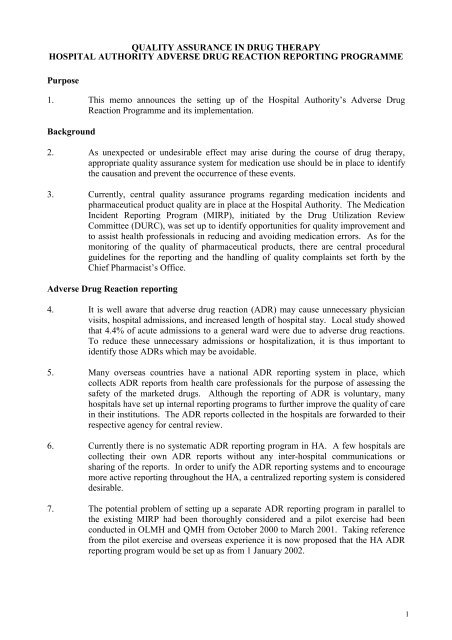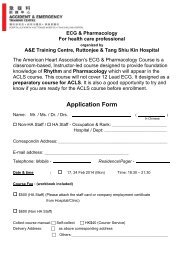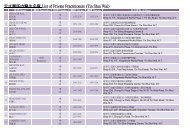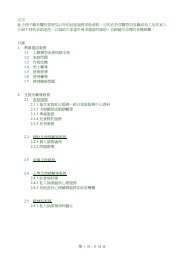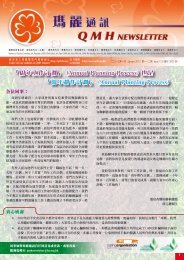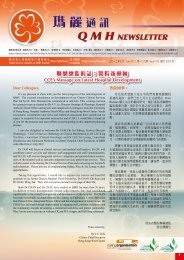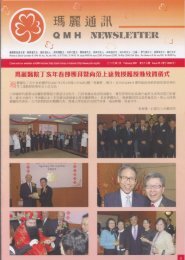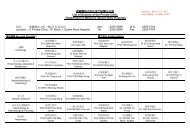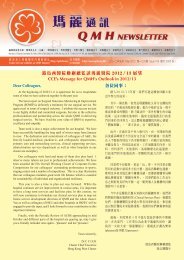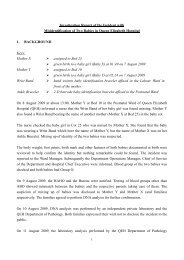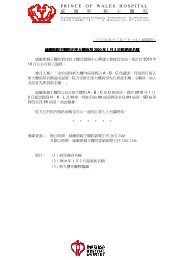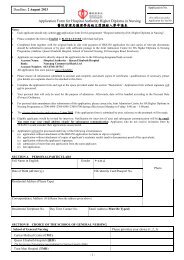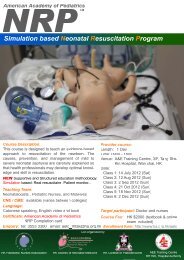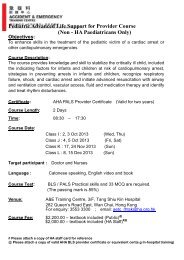2005 Edition Report on Drug Administration Procedure & Practices ...
2005 Edition Report on Drug Administration Procedure & Practices ...
2005 Edition Report on Drug Administration Procedure & Practices ...
You also want an ePaper? Increase the reach of your titles
YUMPU automatically turns print PDFs into web optimized ePapers that Google loves.
QUALITY ASSURANCE IN DRUG THERAPYHOSPITAL AUTHORITY ADVERSE DRUG REACTION REPORTING PROGRAMMEPurpose1. This memo announces the setting up of the Hospital Authority’s Adverse <strong>Drug</strong>Reacti<strong>on</strong> Programme and its implementati<strong>on</strong>.Background2. As unexpected or undesirable effect may arise during the course of drug therapy,appropriate quality assurance system for medicati<strong>on</strong> use should be in place to identifythe causati<strong>on</strong> and prevent the occurrence of these events.3. Currently, central quality assurance programs regarding medicati<strong>on</strong> incidents andpharmaceutical product quality are in place at the Hospital Authority. The Medicati<strong>on</strong>Incident <str<strong>on</strong>g>Report</str<strong>on</strong>g>ing Program (MIRP), initiated by the <strong>Drug</strong> Utilizati<strong>on</strong> ReviewCommittee (DURC), was set up to identify opportunities for quality improvement andto assist health professi<strong>on</strong>als in reducing and avoiding medicati<strong>on</strong> errors. As for them<strong>on</strong>itoring of the quality of pharmaceutical products, there are central proceduralguidelines for the reporting and the handling of quality complaints set forth by theChief Pharmacist’s Office.Adverse <strong>Drug</strong> Reacti<strong>on</strong> reporting4. It is well aware that adverse drug reacti<strong>on</strong> (ADR) may cause unnecessary physicianvisits, hospital admissi<strong>on</strong>s, and increased length of hospital stay. Local study showedthat 4.4% of acute admissi<strong>on</strong>s to a general ward were due to adverse drug reacti<strong>on</strong>s.To reduce these unnecessary admissi<strong>on</strong>s or hospitalizati<strong>on</strong>, it is thus important toidentify those ADRs which may be avoidable.5. Many overseas countries have a nati<strong>on</strong>al ADR reporting system in place, whichcollects ADR reports from health care professi<strong>on</strong>als for the purpose of assessing thesafety of the marketed drugs. Although the reporting of ADR is voluntary, manyhospitals have set up internal reporting programs to further improve the quality of carein their instituti<strong>on</strong>s. The ADR reports collected in the hospitals are forwarded to theirrespective agency for central review.6. Currently there is no systematic ADR reporting program in HA. A few hospitals arecollecting their own ADR reports without any inter-hospital communicati<strong>on</strong>s orsharing of the reports. In order to unify the ADR reporting systems and to encouragemore active reporting throughout the HA, a centralized reporting system is c<strong>on</strong>sidereddesirable.7. The potential problem of setting up a separate ADR reporting program in parallel tothe existing MIRP had been thoroughly c<strong>on</strong>sidered and a pilot exercise had beenc<strong>on</strong>ducted in OLMH and QMH from October 2000 to March 2001. Taking referencefrom the pilot exercise and overseas experience it is now proposed that the HA ADRreporting program would be set up as from 1 January 2002.1


